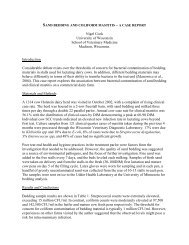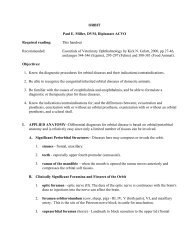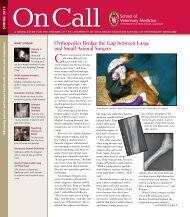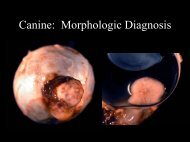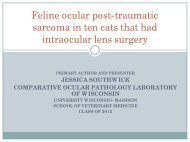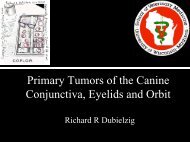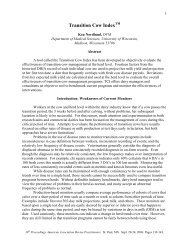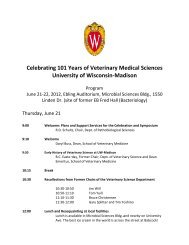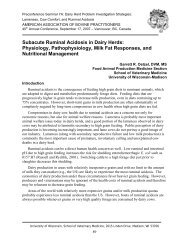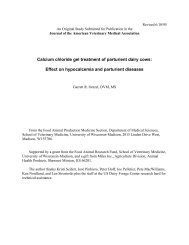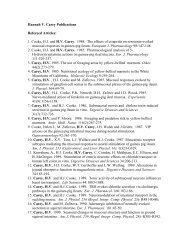On Call Fall / Winter 2011 - School of Veterinary Medicine ...
On Call Fall / Winter 2011 - School of Veterinary Medicine ...
On Call Fall / Winter 2011 - School of Veterinary Medicine ...
Create successful ePaper yourself
Turn your PDF publications into a flip-book with our unique Google optimized e-Paper software.
The West Nile virus casts a broad<br />
net <strong>of</strong> influence, entwining itself<br />
in the mosquitoes that transmit<br />
it, the birds that carry it, the<br />
animals and people that are affected<br />
by it, and the environment<br />
it spreads through. But to understand<br />
that complex picture, you<br />
need to understand the virus itself.<br />
Dr. Kristen Bernard, an associate<br />
pr<strong>of</strong>essor in the Department <strong>of</strong><br />
Pathobiological Sciences, is using<br />
her research to untangle the functions<br />
<strong>of</strong> West Nile virus.<br />
“I’m trying to understand<br />
how the virus causes disease,” said<br />
Bernard. “What I want is to understand<br />
each step <strong>of</strong> what the virus is<br />
doing in the body.”<br />
The virus, first seen on the east<br />
coast in 1999 before spreading<br />
rapidly across the US, is an arthropod<br />
(insect)-borne virus. Although<br />
not common in Wisconsin, West<br />
Nile presents a serious threat as<br />
it has no known treatment. The<br />
18<br />
Research<br />
Understanding west Nile virus<br />
West Nile can linger,<br />
especially in the brain,<br />
long after the animal<br />
recovers from the illness<br />
virus cycles between mosquitoes<br />
and birds, then spreads when an<br />
infected mosquito bites a healthy<br />
animal. According to Bernard,<br />
some are more affected than others,<br />
with humans, horses, and<br />
some types <strong>of</strong> birds hit the hardest.<br />
“Crows are exquisitely sensitive<br />
to the virus,” said Bernard. “Other<br />
animals can become infected,<br />
it’s just not very common. Dogs,<br />
wolves, alpacas—there was an outbreak<br />
in alligators in 2002.”<br />
But the common thread among all<br />
these species is one tiny buzzing<br />
insect. “In nature, there isn’t any<br />
vertebrate to vertebrate transmission,”<br />
Bernard said. “You need to<br />
have that mosquito.”<br />
Using a mouse model, Bernard<br />
dr. tony goldberg joins global health institute<br />
as Associate director for research<br />
tony Goldberg, PhD, DVM, will<br />
soon take up the position <strong>of</strong> Associate<br />
Director for Research at the<br />
University <strong>of</strong> Wisconsin’s new Global<br />
Health Institute, in addition to his<br />
work at the UW <strong>School</strong> <strong>of</strong> <strong>Veterinary</strong><br />
<strong>Medicine</strong>. The institute, a product <strong>of</strong><br />
a new merger between the University’s<br />
Center for Global Health and<br />
the Global Health Initiative, seeks<br />
to unite pr<strong>of</strong>essionals from a broad<br />
range <strong>of</strong> fields with the goal <strong>of</strong><br />
tackling health concerns that have a<br />
worldwide reach. The institute will<br />
draw together the best and brightest<br />
minds from the UW campus and<br />
beyond, uniting disparate fields <strong>of</strong><br />
study with the common purpose <strong>of</strong><br />
improving UW–Madison’s ability to<br />
study, practice, and deliver global<br />
health. “This is a watershed moment<br />
for global health on the UW<br />
campus,” said Goldberg. “The new<br />
Global Health Institute unites a<br />
diversity <strong>of</strong> units across campus into<br />
a single overarching organization.<br />
This will improve the efficiency <strong>of</strong><br />
our campus’s global health efforts<br />
while creating new synergies and<br />
opportunities.”<br />
Goldberg’s research here in<br />
Madison focuses on epidemiology<br />
and the evolution <strong>of</strong> infectious<br />
diseases, including big picture concepts<br />
like interactions between the<br />
virus, the host, and diverse ecosystems.<br />
With work ranging from the<br />
spread <strong>of</strong> West Nile in urban hot<br />
spots like Chicago; to interactions<br />
between humans, primates, and<br />
livestock in Uganda; to viral diseases<br />
in swine and fish, Goldberg’s broad<br />
knowledge <strong>of</strong> ecosystems and<br />
interactions makes him a perfect<br />
fit for the Global Health Institute.<br />
This long-term view, encompassing<br />
all the players in an ecosystem,<br />
is invaluable for the institute’s aim<br />
Dr. Kristen Bernard examines the<br />
cells used to grow and replicate West<br />
Nile virus, a key tool for her research<br />
into how the virus causes disease.<br />
is examining what happens after<br />
that mosquito bites. This includes<br />
interactions between the body,<br />
the virus, and even the mosquito<br />
saliva. Her work is yielding interesting<br />
findings. “We get more virus<br />
replication when there’s mosquito<br />
to solve problems in a holistic and<br />
sustainable fashion, without causing<br />
unintended consequences down<br />
the line.<br />
Others in the institute come from<br />
a range <strong>of</strong> backgrounds, including<br />
veterinary and human medicine,<br />
sociology, anthropology, agriculture,<br />
and population studies. Many have<br />
an interdisciplinary background,<br />
with diverse interests that add to a<br />
wide cumulative experience pool.<br />
In this new appointment, Goldberg<br />
will team up with major partners in<br />
Belize, Ethiopia, China, Thailand,<br />
Mexico, Uganda, and Ecuador to<br />
address issues like the spread and<br />
control <strong>of</strong> disease and implications<br />
<strong>of</strong> pesticides on long-term development.<br />
With this team <strong>of</strong> experts, the<br />
Global Health Institute is moving<br />
closer than ever to an understanding<br />
<strong>of</strong> our world that could help create a<br />
truly positive impact.<br />
saliva there,” said Bernard. She explained<br />
how this might indicate<br />
the presence <strong>of</strong> a protein in the<br />
saliva that changes the impact <strong>of</strong><br />
the virus. “The long-term idea is,<br />
if you could identify that protein,<br />
you could make a vaccine.”<br />
Bernard’s work is also taking<br />
steps towards understanding the<br />
lasting effects <strong>of</strong> West Nile on the<br />
body. “It’s typically thought that<br />
West Nile infects the host, the host<br />
mounts a response, and then it’s<br />
gone,” said Bernard. But her research<br />
shows that West Nile can<br />
linger, especially in the brain, long<br />
after the animal recovers from<br />
the illness. She explained that the<br />
body’s immune system is responsible<br />
for eliminating the virus, but<br />
too strong <strong>of</strong> an immune response<br />
can actually damage the body’s<br />
healthy tissue, especially sensitive<br />
tissue like the brain. “That’s the<br />
fine line the body’s walking down,”<br />
said Bernard. “In this case, it’s an<br />
advantage to the virus.” The body<br />
protects the brain, and accidentally<br />
leaves some virus behind.<br />
But what’s the difference if<br />
you carry the virus around with<br />
you, as long as you’re not sick?<br />
According to Bernard, it makes<br />
all the difference in the world to<br />
someone who receives an organ<br />
donation or a blood transfusion<br />
from a previously infected donor,<br />
and the recipient may become<br />
dangerously ill even if the donor<br />
showed no symptoms at all.<br />
For Bernard, this research is<br />
all about digging into the fundamental<br />
functions <strong>of</strong> the virus. She<br />
hopes that her research will pave<br />
the way for future advances in<br />
West Nile prevention and cure,<br />
with a better understanding <strong>of</strong> the<br />
disease itself. “I want to do the<br />
basic research with the goal that it<br />
will be useful in human and veterinary<br />
medicine,” said Bernard.<br />
Ali Bartol



